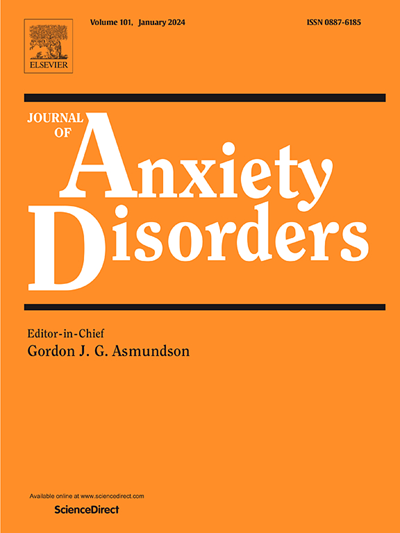针对患有焦虑症和抑郁症的儿童和青少年的团体元认知疗法:初步试验和拟议机制测试
IF 4.5
2区 医学
Q1 PSYCHIATRY
引用次数: 0
摘要
初步研究支持元认知疗法(MCT)对患有广泛焦虑症的儿童的可行性,但元认知疗法对治疗患有其他焦虑症和抑郁症的儿童的有效性在很大程度上仍是未知数。本研究的目的是调查元认知疗法针对儿童和青少年焦虑和抑郁症状的相关效果,并研究元认知模型提出的机制。97名年龄在10-17岁之间、患有焦虑症和抑郁症的参与者(中=12.9 ± 1.9,82.5%为女性)接受了八节小组MCT课程。参与者在治疗前和治疗后接受了诊断评估,并在治疗前、治疗中和治疗后完成了症状和过程测量,并在三个月和六个月的随访中再次完成了症状和过程测量。多层次模型用于研究治疗相关效应和中介效应。结果显示,治疗后总症状大幅减少(d = 1.28)。这些症状的减轻与认知注意力综合征(CAS)、元认知信念和自我报告的注意力控制的变化有关,并且在时间上先于这些变化,但与客观注意力控制无关。治疗效果在六个月的随访中得以保持(d = 1.18)。我们的研究结果表明,MCT 对患有焦虑症和抑郁症的儿童和青少年可能是一种很有前景的治疗方法,并提供了初步证据,证明认知注意综合征、元认知和感知注意力控制的变化是治疗效果的潜在驱动因素。本文章由计算机程序翻译,如有差异,请以英文原文为准。
Group metacognitive therapy for children and adolescents with anxiety and depression: A preliminary trial and test of proposed mechanisms
Preliminary research supports the feasibility of metacognitive therapy (MCT) in children with generalized anxiety, but the effectiveness of MCT in treating children with other anxiety and depressive disorders largely remains unknown. The purpose of this study was to investigate the effects associated with MCT in targeting symptoms of anxiety and depression in children and adolescents and to investigate mechanisms proposed by the metacognitive model. Ninety-seven participants aged 10–17 years (M = 12.9 ± 1.9, 82.5 % females) with anxiety and depressive disorders received eight sessions of group MCT. Participants were diagnostically assessed at pre- and post-treatment and completed symptom and process measures before, during, and after treatment, and again at three- and six-month follow-up. Multilevel models were conducted to investigate treatment-related and mediation effects. Results showed large reductions in total symptoms following treatment (d = 1.28). These reductions were associated with, and temporally preceded by changes in cognitive attentional syndrome (CAS), metacognitive beliefs, and self-reported attention control, but not objective attention control. Treatment gains were maintained at six-month follow-up (d = 1.18). Our results indicate that MCT may be a promising treatment for children and adolescents with anxiety and depression and provide preliminary evidence of changes in CAS, metacognition, and perceived attention control as potential drivers of treatment effects.
求助全文
通过发布文献求助,成功后即可免费获取论文全文。
去求助
来源期刊

Journal of Anxiety Disorders
Multiple-
CiteScore
16.60
自引率
2.90%
发文量
95
期刊介绍:
The Journal of Anxiety Disorders is an interdisciplinary journal that publishes research papers on all aspects of anxiety disorders for individuals of all age groups, including children, adolescents, adults, and the elderly. Manuscripts that focus on disorders previously classified as anxiety disorders such as obsessive-compulsive disorder and posttraumatic stress disorder, as well as the new category of illness anxiety disorder, are also within the scope of the journal. The research areas of focus include traditional, behavioral, cognitive, and biological assessment; diagnosis and classification; psychosocial and psychopharmacological treatment; genetics; epidemiology; and prevention. The journal welcomes theoretical and review articles that significantly contribute to current knowledge in the field. It is abstracted and indexed in various databases such as Elsevier, BIOBASE, PubMed/Medline, PsycINFO, BIOSIS Citation Index, BRS Data, Current Contents - Social & Behavioral Sciences, Pascal Francis, Scopus, and Google Scholar.
 求助内容:
求助内容: 应助结果提醒方式:
应助结果提醒方式:


